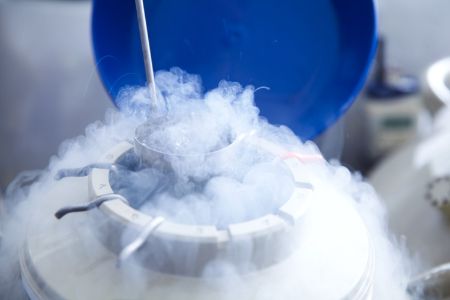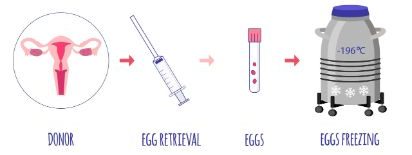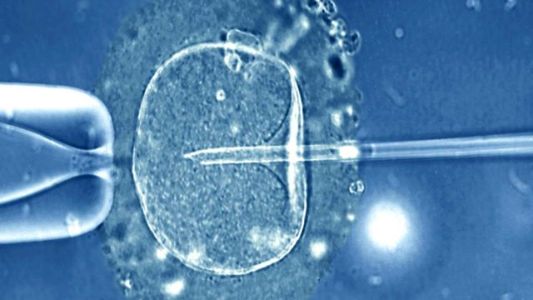The cost of egg freezing varies widely based on factors such as the clinic, location, and the number of cycles required. On average, the initial cost for one egg freezing cycle, including hormone medications, monitoring, and egg retrieval, ranges from $5,000 to $20,000. This cost does not include the annual storage fees, ranging from $300 to $1000.
Additionally, when using frozen eggs, the IVF procedure and embryo transfer cost will need to be considered, which may range from $10,000 to $15,000 or more. Some clinics offer package deals or payment plans to help ease the financial burden, but evaluating the options and considering the total cost is critical.
Egg freezing in Canada costs around $4,000 to $10,000 per cycle. The storage fee is around $500 a year. The costs in the UK range from 3,000 to 5,000 pounds with a 500 to 1,000 pounds storage fee per year.
 Image Source: Bloomberg
Image Source: Bloomberg
Can I Pay for Egg Freeze through Health Insurance?
Whether egg freezing is covered by health insurance depends on your specific policy, the reason for the procedure, and the regulations in your country or state. The two main types of egg freezing are elective and medical egg freezing.
Elective egg freezing: when a woman chooses to freeze her eggs for personal reasons, such as wanting to delay pregnancy for career or lifestyle considerations. Most health insurance policies do not cover elective egg freezing, which is considered an optional procedure.
Medical egg freezing: When a woman has a medical condition or requires treatment (such as chemotherapy) that could negatively affect her fertility. Some health insurance policies may cover egg freezing as a fertility preservation method in these cases. The extent of coverage can vary widely, so it’s essential to carefully review your insurance policy or consult with your insurance provider to determine what is covered.
Some countries or states (currently 19 US states) have laws that mandate coverage for fertility preservation in specific circumstances, such as a cancer diagnosis. It’s crucial to understand the regulations in your area and how they might apply to your situation.

Other Ways to Pay for Egg Freezing
Loans
Most fertility clinics accept credit cards, but the total amount may exceed your credit limit. Many companies and lending institutions provide loans for healthcare purposes. You must have a strong credit history to get your loan approved. Prosper Healthcare Lending and LendingClub are two companies that provide loans for fertility procedures.

Employers
Some employers may offer to pay egg freezing for their employees. Apple and Facebook are two companies that pay their employees to freeze eggs, regardless of medical or non-medical reasons.
Grants
Some organizations offer grants to certain demographic groups to freeze eggs.
What’s the Right Age to Freeze Eggs?
Most reproductive endocrinologists and gynecologists recommend freezing eggs in the late 20s or early 30s. You can do it later, too, but it is better to do it before you turn 38. On the contrary, doctors recommend doing it sooner if you have a disease that may decrease the quantity and quality of your eggs.
What is Egg Freezing?
Egg freezing, or oocyte cryopreservation, is a fertility preservation technique that involves extracting and freezing a woman’s eggs for future use. The process allows women to delay pregnancy, allowing them to conceive later when they are ready or when medical conditions make natural conception difficult.
The procedure involves hormone injections (twice daily for 8 to 10 days) to stimulate the ovaries and produce multiple mature eggs. You’ll have to inject a trigger shot for the final time 36 hours before egg retrieval.
Once the eggs are retrieved, they are flash-frozen using vitrification, which prevents ice crystal formation. The frozen eggs can be stored for several years and, when desired, thawed and fertilized using in-vitro-fertilization (IVF) to create an embryo that can be implanted in the uterus for a pregnancy attempt.
 Image Source: Apollo Fertility
Image Source: Apollo Fertility
What is the success rate in Egg Freezing?
Egg freezing success rates depend on several factors, including the woman’s age at the time of freezing, egg quality, and the number of eggs retrieved. Generally, younger women have higher success rates due to better egg quality and quantity.
The thawing and fertilization process also plays a role in success rates. Advances in vitrification and IVF techniques have significantly improved the chances of achieving a successful pregnancy with frozen eggs. However, it is important to remember that success is not guaranteed, and individual outcomes may vary.
 Image Source: BBC
Image Source: BBC
What is Embryo Freezing, and how much does it Cost?
Embryo freezing, or cryopreservation, is a technique used to preserve embryos for future use in fertility treatments. It involves creating embryos through in vitro fertilization (IVF) and then freezing them at a very early stage of development. This allows couples or individuals to store embryos for later use, providing flexibility in timing for pregnancy attempts.
The cost of embryo freezing varies depending on factors such as the clinic and location. Generally, the costs are incorporated into the overall IVF treatment, ranging from $10,000 to $15,000 or more per cycle. Additional expenses include annual storage fees, ranging from $300 to $600. When ready to use the embryos, there will be a fee for the thawing and transfer process, which may vary by clinic.
Please note that when you opt for embryo freezing, you’ll commit to a specific sperm source. The process cannot be undone.